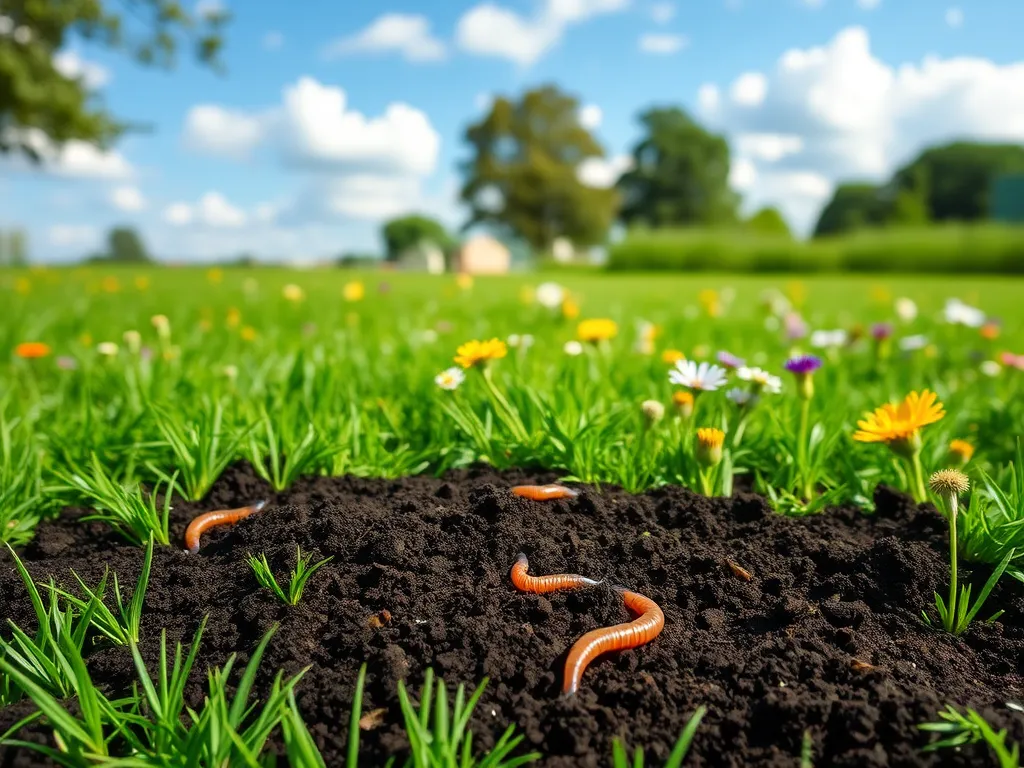Explore The Role of Compost in Organic Lawn Care Solutions

The Role of Compost in Organic Lawn Care
The Role of Compost in Organic Lawn Care is not just significant but transformative. Compost serves as a natural, organic fertilizer that enriches the soil, improves health, and supports sustainable lawn maintenance practices. As homeowners increasingly seek eco-friendly landscaping solutions, understanding the vital role of compost is essential for creating lush, green, and resilient lawns while minimizing chemical inputs.
One of the key aspects of The Role of Compost in Organic Lawn Care is its contribution to enriching soil nutrients. Compost is rich in micronutrients and macronutrients necessary for vibrant plant growth. By incorporating compost into lawn care routines, homeowners can provide their grass with readily available nutrients, effectively encouraging deeper root growth, better drought resistance, and enhanced overall health. It represents a holistic approach to turf management.
Utilizing a compost tea application can dramatically improve plant vitality and soil structure over time.
Beyond nutrient enrichment, The Role of Compost in Organic Lawn Care encompasses the improvement of soil structure. Compost enhances soil aeration, promotes drainage, and contributes to the formation of soil aggregates. This improved soil structure allows roots to penetrate effortlessly and access nutrients and water more efficiently, creating a solid foundation for lawns and plants. This attribute is particularly beneficial in heavy clay or sandy soils, where traditional grass growth can be challenging.
Moreover, The Role of Compost in Organic Lawn Care extends to water retention and drainage benefits. Properly compost-enriched soil has an increased capacity to retain moisture, which is crucial during dry spells. The organic matter in compost acts like a sponge, absorbing and holding water, thus reducing the necessity for frequent watering. This characteristic not only fosters a healthier lawn but also contributes to significant water conservation—an essential factor in sustainable landscaping practices.
Understanding the principles of natural nutrient cycling can lead to healthier ecosystems and reduced reliance on chemical fertilizers.
Another critical aspect of The Role of Compost in Organic Lawn Care is its support for beneficial microorganisms. Compost is a living resource that introduces a plethora of beneficial microbes into the soil ecosystem. These microorganisms help break down organic matter, convert nutrients into plant-available forms, and improve overall soil health. By nurturing microbial diversity, compost contributes to a balanced soil ecosystem that supports healthy grass growth while minimizing the need for fertilizers and pesticides.
Benefits of Compost in Lawn Care
One of the primary benefits of using compost in lawn care is nutrient enrichment. Compost contains a blend of essential nutrients that grass needs to thrive, such as nitrogen, phosphorus, and potassium, along with numerous micronutrients. This nutrient-rich amendment can effectively boost the growth rate of grass, offering a vibrant color and lush appearance without harmful chemicals.
Investing in soil microbe enhancement is crucial for fostering sustainable agriculture and increasing crop yields effectively.
Improvement of soil structure is another critical advantage. Compost enhances soil porosity and allows for better aeration, which promotes root development. Healthy soil structure also helps prevent compaction, enabling roots to access water and nutrients more effectively, contributing to overall lawn vitality.
The water retention and drainage benefits of compost play a significant role in effective lawn care. The organic matter in compost increases the soil's ability to retain moisture during dry periods while also facilitating proper drainage to avoid waterlogging. This balance is essential for maintaining a healthy lawn and conserving water resources.
Supporting beneficial microorganisms is a key benefit of compost, as it fosters a thriving soil ecosystem. These microorganisms break down organic matter and improve nutrient availability for plants. The use of compost encourages microbial diversity, which is crucial for long-term soil health and plant growth.
Reducing reliance on chemical fertilizers is a significant aspect of modern organic lawn care, and compost plays a crucial role in this transition. By using compost, homeowners can provide their lawns with all the necessary nutrients naturally, thereby promoting a healthier and more sustainable ecosystem free from synthetic additives.
Types of Compost for Organic Lawns
When it comes to Types of Compost for Organic Lawns, homeowners can choose between homemade compost and store-bought options. Homemade compost, created from kitchen scraps, yard waste, and other organic materials, can be tailored to suit individual lawn needs. On the other hand, store-bought compost offers convenience and consistency in quality, though it may lack some personalized benefits of homemade mixtures.
Worm castings are another type of compost that has gained popularity among organic gardeners and lawn enthusiasts. Rich in nutrients, worm castings enhance soil fertility and support microbial activity while promoting plant growth. These nutrient-dense materials can be especially beneficial for lawns needing a nutrient boost.
There are various types of compost materials that can be used for organic lawns, including green materials (such as fresh grass clippings or kitchen scraps) and brown materials (like dried leaves or shredded paper). A well-balanced mixture of these materials ensures a nutrient-dense compost that supports lawn health and growth.
Using compost tea in lawn care is another innovative technique that enhances the benefits of compost. Compost tea is a liquid extract made by steeping compost in water, creating a nutrient-rich solution that can be sprayed on the lawn. This method offers quick nutrient uptake and boosts microbial health.
Choosing the right compost mix involves assessing the specific needs of your lawn and understanding the types of nutrients required. A balanced compost mix that contains a range of ingredients can promote healthy growth and improve soil quality, fostering long-term sustainability in lawn care practices.
Application Techniques for Compost
Top dressing methods for lawns involve spreading a thin layer of compost over the existing grass. This technique can improve soil health without disturbing the lawn. For optimal results, the compost layer should be about a quarter to half an inch thick, allowing grass to receive the nutrients and enhancing microbial activity beneath.
Incorporating compost into soil is an effective technique when establishing a new lawn or renovating an existing one. Mixing compost with soil at planting time can enhance nutrient availability, support root establishment, and improve the overall health of the new grass.
Using compost during seeding is another viable application technique. Mixing compost with seed can ensure the grass has immediate access to essential nutrients, promoting faster germination and rooting. This approach is particularly beneficial for thin or patchy lawns that need rejuvenation.
Spraying compost tea as foliar feed can provide an additional nutrient boost directly to the grass blades. This method maximizes the absorption of nutrients, ensuring that plants receive a quick source of nourishment, especially during peak growth periods.
Timing and frequency of compost applications are essential for successful lawn care. Applying compost during spring or fall, when the grass is actively growing, allows for maximum nutrient absorption. Generally, top dressing with compost once or twice a year can significantly improve lawn appearance and health.
Compost and Soil Health
The impact of compost on soil microbial life cannot be overstated. Compost introduces beneficial microorganisms that contribute to soil health and vitality. These microbes actively break down organic matter, enhance nutrient cycling, and promote stronger plant growth, creating a robust ecosystem within the soil.
Improving soil pH with compost is another significant benefit. Organic matter from compost can help buffer soil pH levels, providing a more stable growing environment for grass. This is particularly beneficial for lawns growing in acidic soils, promoting better nutrient availability.
Organic matter plays a vital role in soil fertility, and compost serves as a primary source of this organic matter. Adequate organic matter in the soil enhances nutrient retention, promotes healthy root growth, and improves water-holding capacity, all crucial elements for a thriving lawn.
Carbon sequestration through composting represents an essential environmental benefit. By incorporating compost into lawn care practices, homeowners contribute to carbon capture, reducing the overall carbon footprint associated with lawn maintenance. Compost enriches soil while mitigating climate change impacts.
Compost also has a noticeable effect on soil erosion. By improving soil structure and enhancing vegetation cover, compost helps mitigate erosion risks associated with heavy rainfall or wind. Healthy lawns supported by compost are more resilient against erosion challenges, ensuring long-term sustainability.
Challenges and Solutions in Compost Use
Identifying compost quality issues is vital for successful lawn care. Ensuring high-quality compost free from contaminants, weed seeds, or pathogens is essential for maintaining healthy grass. Homeowners should seek compost sourced from reputable suppliers or produce their compost to ensure quality.
Dealing with compost odor problems can arise from improper composting techniques. Appropriate carbon-to-nitrogen ratios, regular turning, and adequate aeration can help mitigate odor concerns. If unpleasant smells persist, investigating compost ingredients may help identify the issue.
Weed seed concerns in compost can pose challenges to lawn care. Using high-quality, fully composted materials minimizes this risk, while methods such as thermal composting can effectively kill any weed seeds present in the compost mix.
Managing nutrient release from compost is crucial for effective application. Compost releases nutrients at varying rates; hence, soil testing can help determine the appropriate amount of compost to use and any additional fertilizers that may be necessary to optimize nutrient availability.
Lastly, balancing compost with other amendments allows for more targeted lawn care. Recognizing the needs of your lawn through soil testing can guide the use of compost alongside other soil amendments, enhancing overall lawn health and vitality.
